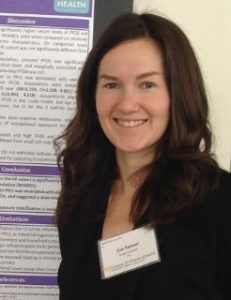Joella Adams
 Joella Adams is a second-year doctoral student in the Department of Epidemiology at the Brown University School of Public Health. She received an MPH from Drexel University School of Public Health in 2014. Following graduation, she was accepted to USAID’s Global Health Fellows Program as the Prevention of Mother-to-Child Transmission intern within the Office of HIV/AIDS. Following her internship, she was the National HIV Behavioral Surveillance System (NHBS) Data Manager for the AIDS Activities Coordinating Office for the Philadelphia Department of Public Health. She is currently working on research projects to examine the impact of mass incarceration on HIV acquisition risk for women. Her long term research goal is to develop a career as an infectious disease epidemiologist with a focus on women’s health and reducing HIV disparities, particularly those related to gender and race.
Joella Adams is a second-year doctoral student in the Department of Epidemiology at the Brown University School of Public Health. She received an MPH from Drexel University School of Public Health in 2014. Following graduation, she was accepted to USAID’s Global Health Fellows Program as the Prevention of Mother-to-Child Transmission intern within the Office of HIV/AIDS. Following her internship, she was the National HIV Behavioral Surveillance System (NHBS) Data Manager for the AIDS Activities Coordinating Office for the Philadelphia Department of Public Health. She is currently working on research projects to examine the impact of mass incarceration on HIV acquisition risk for women. Her long term research goal is to develop a career as an infectious disease epidemiologist with a focus on women’s health and reducing HIV disparities, particularly those related to gender and race.
Kara Bensley
 Kara Bensley is a doctoral candidate at the University of Washington in the Department of Health Services. She received an M.Sc. in Medical Anthropology in 2011 from University College London, and a B.S. from Michigan State University in 2009. She has research interests in mental health and substance use treatment, harm reduction among vulnerable populations, and promoting health equity in racial/ethnic minorities and rural populations. She has applied these interests to research on equitable access to alcohol treatment among vulnerable populations of veterans and on the association between mental illness and unhealthy alcohol use among military personnel. Her dissertation examines differences in alcohol use, care, and outcomes across race/ethnicity and rurality among patients living with HIV who receive care in the Veterans Health Administration.
Kara Bensley is a doctoral candidate at the University of Washington in the Department of Health Services. She received an M.Sc. in Medical Anthropology in 2011 from University College London, and a B.S. from Michigan State University in 2009. She has research interests in mental health and substance use treatment, harm reduction among vulnerable populations, and promoting health equity in racial/ethnic minorities and rural populations. She has applied these interests to research on equitable access to alcohol treatment among vulnerable populations of veterans and on the association between mental illness and unhealthy alcohol use among military personnel. Her dissertation examines differences in alcohol use, care, and outcomes across race/ethnicity and rurality among patients living with HIV who receive care in the Veterans Health Administration.
Giehae Choi
 Giehae is a PhD student in the Department of Epidemiology at UNC. She received her MPH and BHS in environmental health from Korea University. Her research interests stem from a goal to reduce environmental health burden via epidemiologic research. Investigating the causal relation of environmental pollution to adverse health effects is her primary area of interest. Her larger study goal is in investigating epidemiologic research methods to facilitate translation of research into practice.
Giehae is a PhD student in the Department of Epidemiology at UNC. She received her MPH and BHS in environmental health from Korea University. Her research interests stem from a goal to reduce environmental health burden via epidemiologic research. Investigating the causal relation of environmental pollution to adverse health effects is her primary area of interest. Her larger study goal is in investigating epidemiologic research methods to facilitate translation of research into practice.
Jacquelyn Cragg
 Dr. Jacquelyn Cragg is currently a Society in Science Branco Weiss Postdoctoral Fellow at the University of Zurich and University of British Columbia. Dr. Cragg is a neuro-epidemiologist with expertise in amyotrophic lateral sclerosis, spinal cord injury, and Parkinson’s disease. Dr. Cragg completed her PhD at the University of British Columbia and her first post-doctoral fellowship at the Harvard T.H. Chan School of Public Health.
Dr. Jacquelyn Cragg is currently a Society in Science Branco Weiss Postdoctoral Fellow at the University of Zurich and University of British Columbia. Dr. Cragg is a neuro-epidemiologist with expertise in amyotrophic lateral sclerosis, spinal cord injury, and Parkinson’s disease. Dr. Cragg completed her PhD at the University of British Columbia and her first post-doctoral fellowship at the Harvard T.H. Chan School of Public Health.
Saruna Ghimire
 Saruna Ghimire is a current PhD student in Epidemiology and Biostatistics at the University of Nevada, Las Vegas. She completed her MPH in 2011 in the United Kingdom, and subsequently served four years as an Assistant Professor and Program Coordinator for the Department of Public Health at the Valley College of Technical Sciences in Kathmandu, Nepal. She has served as Principal Investigator in several grant-funded public health research projects in Nepal examining barriers to compliance with lifestyle changes among diabetic and hypertensive adults. She has published a book on “Applied Epidemiology” relevant to Nepalese context. Her doctoral research focuses on geriatric health and nutritional issues.
Saruna Ghimire is a current PhD student in Epidemiology and Biostatistics at the University of Nevada, Las Vegas. She completed her MPH in 2011 in the United Kingdom, and subsequently served four years as an Assistant Professor and Program Coordinator for the Department of Public Health at the Valley College of Technical Sciences in Kathmandu, Nepal. She has served as Principal Investigator in several grant-funded public health research projects in Nepal examining barriers to compliance with lifestyle changes among diabetic and hypertensive adults. She has published a book on “Applied Epidemiology” relevant to Nepalese context. Her doctoral research focuses on geriatric health and nutritional issues.
Hua Huang
 My name is Hua Huang, a biostatistical PhD candidate of University of Wisconsin Milwaukee. I’m currently working on epigenetic field, exploring genetic and environmental risk factors for various diseases and cancers, such as autism, cardiovascular disease, colon cancer, etc. I also work to develop statistical methods to analysis genome-wide association study data, DNA sequencing data, as well as RNA sequencing data under supervision of professors. With one and a half years’ biostatistical and epidemiological training, I increasingly feel the meaningfulness and interestingness of researches I’m working on. And with full of passion and systematic training, hope I can make more contributions to our community! Thank you so much SER offering me this SPC travel scholarship!
My name is Hua Huang, a biostatistical PhD candidate of University of Wisconsin Milwaukee. I’m currently working on epigenetic field, exploring genetic and environmental risk factors for various diseases and cancers, such as autism, cardiovascular disease, colon cancer, etc. I also work to develop statistical methods to analysis genome-wide association study data, DNA sequencing data, as well as RNA sequencing data under supervision of professors. With one and a half years’ biostatistical and epidemiological training, I increasingly feel the meaningfulness and interestingness of researches I’m working on. And with full of passion and systematic training, hope I can make more contributions to our community! Thank you so much SER offering me this SPC travel scholarship!
Ellen Jackson
Ellen Jackson, MPH, is a current DVM/PhD student at Oklahoma State University. She is interested in One Health and infectious disease epidemiology. Her past research investigated cardiac glucose metabolism during type II diabetes. Her current research interest is exploring causal factors behind human cysticercosis infection, and particularly the application of directed acyclic graphs for understanding confounding in cysticercosis research.
Thomas Joshua
 Mr. Thomas V. Joshua, MS is a student in PhD Epidemiology (2nd year) program at College of Public Health at University of Georgia, Athens Campus. At present, He is doing research in Tuberculosis disease among Mexican immigrant population in the United States under the mentorship of Dr. Christopher Whalen, MD, MPH. He received a Master’s degree in Epidemiology in 2007 from the Medical College of Wisconsin. He also received a bachelor’s degree in mathematics and statistics and master’s degree in mathematics. He has excellent mathematical and statistical foundation for quantitative research. He is also an Assistant Professor in The College of Nursing, Augusta University (AU) and Data Manager/Consultant for the College’s Center for Nursing Research. Read more
Mr. Thomas V. Joshua, MS is a student in PhD Epidemiology (2nd year) program at College of Public Health at University of Georgia, Athens Campus. At present, He is doing research in Tuberculosis disease among Mexican immigrant population in the United States under the mentorship of Dr. Christopher Whalen, MD, MPH. He received a Master’s degree in Epidemiology in 2007 from the Medical College of Wisconsin. He also received a bachelor’s degree in mathematics and statistics and master’s degree in mathematics. He has excellent mathematical and statistical foundation for quantitative research. He is also an Assistant Professor in The College of Nursing, Augusta University (AU) and Data Manager/Consultant for the College’s Center for Nursing Research. Read more
Parisa Karimi
 Born and raised in Iran, Parisa Karimi is a doctoral candidate in the Environmental and Occupational Health department of the George Washington University. She holds a medical degree from Iran University of Medical Sciences and has gained robust multidisciplinary training in different aspects of Public Health. Her research interest includes examining the role of environmental factors and contaminants in development of non-communicable diseases. She is also interested to apply findings from epidemiologic studies to shape and revise national and international health regulations. She collaborates with prominent investigators from National Institute of Health, Johns Hopkins Bloomberg School of Public Health, and Tehran University of Medical Sciences. Based on her contribution in epidemiologic studies, she has received several awards, including International Development and Education Award from American Society of Clinical Oncology (ASCO) and a fellowship award from Union for International Cancer Control (UICC).
Born and raised in Iran, Parisa Karimi is a doctoral candidate in the Environmental and Occupational Health department of the George Washington University. She holds a medical degree from Iran University of Medical Sciences and has gained robust multidisciplinary training in different aspects of Public Health. Her research interest includes examining the role of environmental factors and contaminants in development of non-communicable diseases. She is also interested to apply findings from epidemiologic studies to shape and revise national and international health regulations. She collaborates with prominent investigators from National Institute of Health, Johns Hopkins Bloomberg School of Public Health, and Tehran University of Medical Sciences. Based on her contribution in epidemiologic studies, she has received several awards, including International Development and Education Award from American Society of Clinical Oncology (ASCO) and a fellowship award from Union for International Cancer Control (UICC).
Chisom Odoh
Chisom Odoh, MPH, was born and raised in Nigeria and is currently a second-year doctoral student in Epidemiology and Population Health, in the School of Public Health at the University of Louisville. She has a Bachelors degree in Biology from Fisk University and a Masters in Public Health from Tennessee State University. Her work experiences include an internship with the Directors of Health Promotion and Education in Atlanta, Georgia, where she participated in health promotion and program evaluation for a men’s oral health and dental access program. She was also a research analyst with Vanderbilt University, Nashville, Tennessee, where she studied domestic violence and HIV among pregnant women in Nigeria. Read more
Meliha Salahuddin
Meliha Salahuddin joined the Texas Collaborative for Healthy Mothers and Babies with Population Health Department of University of Texas System in Spring of 2017 as a post-doctoral research fellow. She earned her PhD in Epidemiology from UTHealth School of Public Health-Austin in 2016. Her research interests focus on understanding risk factors of chronic diseases and maternal and child health.
Eva Tanner
 Eva is a doctoral candidate in the Department of Environmental Health Sciences at the University at Albany, School of Public Health. Her dissertation research explores the effect of polychlorinated biphenyls on cognitive decline in the elderly using a comparative statistical treatment of chemical exposure to challenge the concentration-addition paradigm. More broadly, her research interests include methodological developments to minimize bias when assessing health effects in the presence of left-censored laboratory data and complex chemical mixtures.
Eva is a doctoral candidate in the Department of Environmental Health Sciences at the University at Albany, School of Public Health. Her dissertation research explores the effect of polychlorinated biphenyls on cognitive decline in the elderly using a comparative statistical treatment of chemical exposure to challenge the concentration-addition paradigm. More broadly, her research interests include methodological developments to minimize bias when assessing health effects in the presence of left-censored laboratory data and complex chemical mixtures.



